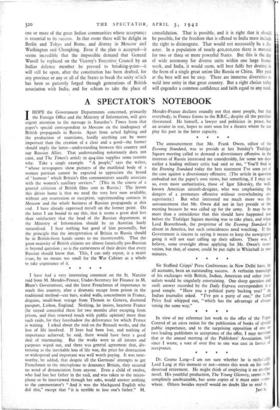A SPECTATOR'S NOTEBOOK
IHOPE the Government Departments concerned, primarily 1. the Foreign Office and the Ministry of Information, will give urgent attention to the message in Saturday's Times from that paper's special correspondent to Moscow on the inadequacy of British propaganda in Russia. Apart from actual fighting and the production of munitions, hardly anything can be more important than the creation of a clear and a good—the former should imply the latter—understanding between this country and our Russian Allies. That understanding notoriously does not exist, and The Times's article in qusltion supplies some reasons why. Take a single example. "A people," says the writer, "whose newspapers show pictures of the mutilated body of a woman partisan cannot be expected to appreciate the brand of ' humour ' which Britain's film commentators usually associate with the women's auxiliary services." (This in the course of a general criticism of British films sent to Russia.) The lesson this drives home is that we need the very best men available, without any reservation or exception, superintending contacts in Moscow and the whole business of Russian propaganda at this end. I have already expressed myself on the former point. On the latter I am bound to say this, that it seems a great deal less than satisfactory that the head of the Russian department at the Ministry of Information should be an Austrian lately naturalised. I hear nothing but good of him personally, but the principle that the interpretation of Britain to Russia should be in British-born hands seems to me incontestable. That the great majority of British citizens are almost fanatically pro-Russian is beyond question ; so is the earnestness of their desire that every Russian should know that. This, I can only repeat, is a major issue, by no means too small for the War Cabinet as a whole to take cognisance of it.


























 Previous page
Previous page